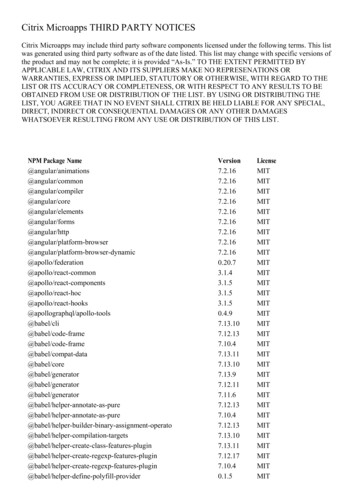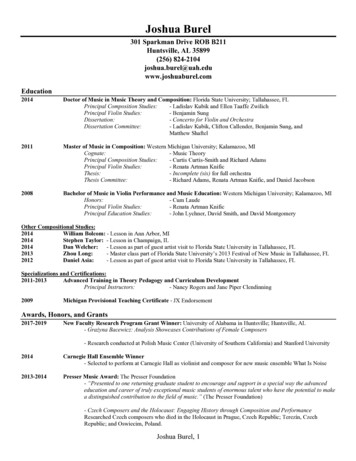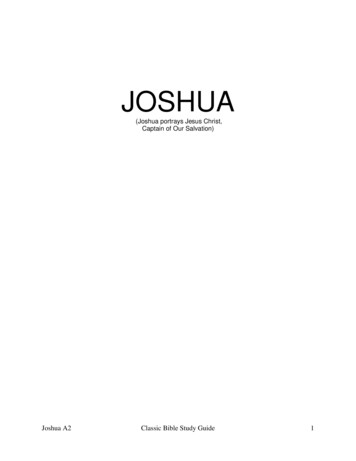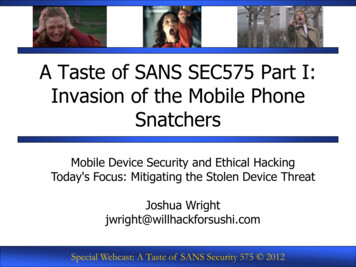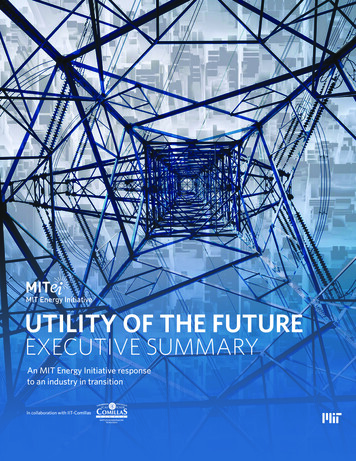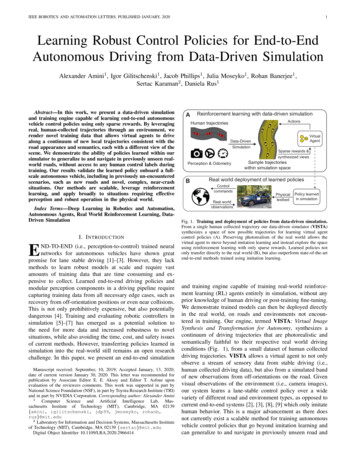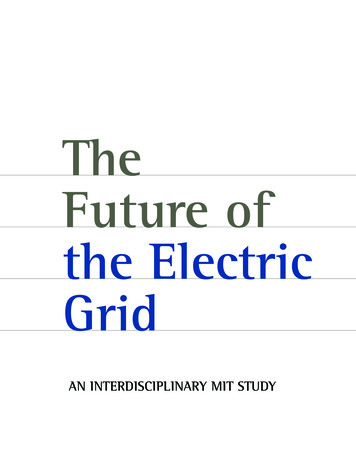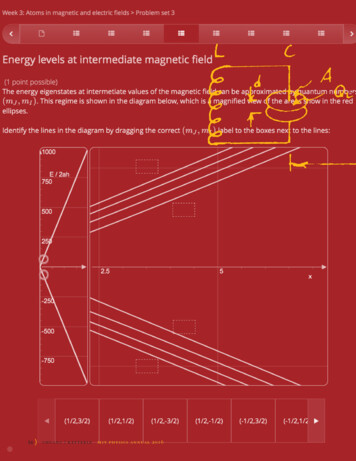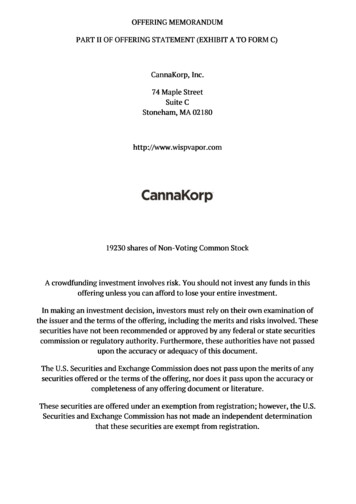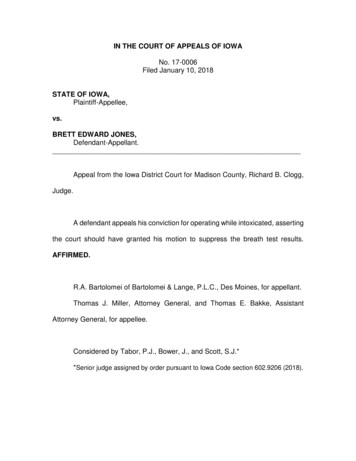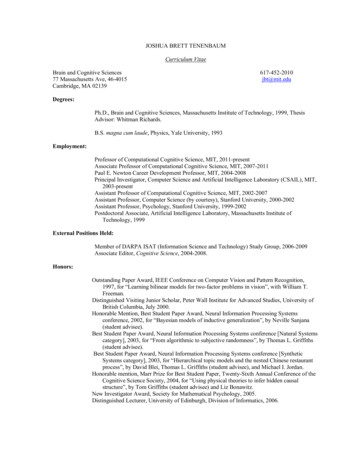
Transcription
JOSHUA BRETT TENENBAUMCurriculum VitaeBrain and Cognitive Sciences77 Massachusetts Ave, 46-4015Cambridge, MA 02139617-452-2010jbt@mit.eduDegrees:Ph.D., Brain and Cognitive Sciences, Massachusetts Institute of Technology, 1999, ThesisAdvisor: Whitman Richards.B.S. magna cum laude, Physics, Yale University, 1993Employment:Professor of Computational Cognitive Science, MIT, 2011-presentAssociate Professor of Computational Cognitive Science, MIT, 2007-2011Paul E. Newton Career Development Professor, MIT, 2004-2008Principal Investigator, Computer Science and Artificial Intelligence Laboratory (CSAIL), MIT,2003-presentAssistant Professor of Computational Cognitive Science, MIT, 2002-2007Assistant Professor, Computer Science (by courtesy), Stanford University, 2000-2002Assistant Professor, Psychology, Stanford University, 1999-2002Postdoctoral Associate, Artificial Intelligence Laboratory, Massachusetts Institute ofTechnology, 1999External Positions Held:Member of DARPA ISAT (Information Science and Technology) Study Group, 2006-2009Associate Editor, Cognitive Science, 2004-2008.Honors:Outstanding Paper Award, IEEE Conference on Computer Vision and Pattern Recognition,1997, for “Learning bilinear models for two-factor problems in vision”, with William T.Freeman.Distinguished Visiting Junior Scholar, Peter Wall Institute for Advanced Studies, University ofBritish Columbia, July 2000.Honorable Mention, Best Student Paper Award, Neural Information Processing Systemsconference, 2002, for “Bayesian models of inductive generalization”, by Neville Sanjana(student advisee).Best Student Paper Award, Neural Information Processing Systems conference [Natural Systemscategory], 2003, for “From algorithmic to subjective randomness”, by Thomas L. Griffiths(student advisee).Best Student Paper Award, Neural Information Processing Systems conference [SyntheticSystems category], 2003, for “Hierarchical topic models and the nested Chinese restaurantprocess”, by David Blei, Thomas L. Griffiths (student advisee), and Michael I. Jordan.Honorable mention, Marr Prize for Best Student Paper, Twenty-Sixth Annual Conference of theCognitive Science Society, 2004, for “Using physical theories to infer hidden causalstructure”, by Tom Griffiths (student advisee) and Liz Bonawitz.New Investigator Award, Society for Mathematical Psychology, 2005.Distinguished Lecturer, University of Edinburgh, Division of Informatics, 2006.
Honorable Mention, Outstanding Student Paper Award, Neural Information Processing Systemsconference, 2006, for “Combining causal and similarity-based reasoning”, by Charles Kemp(student advisee), Patrick Shafto, and Allison Berke.Early Investigator Award, Society of Experimental Psychologists, 2007.Fellow, Society of Experimental Psychologists, 2007.Distinguished Lecturer, University of British Columbia, Institute for Computing, Information,and Cognitive Systems, 2007.Distinguished Lecturer, University of California, San Diego, Department of Cognitive Science,2007.Computational Modeling Prize for Best Paper on Perception and Action, Twenty-Ninth AnnualConference of the Cognitive Science Society, 2007, for “Learning grounded causal models”,with Noah Goodman and Vikash Mansinghka.Computational Modeling Prize for Best Paper on Higher-Level Cognition, Twenty-Ninth AnnualConference of the Cognitive Science Society, 2007, for “Learning causal schemata”, withCharles Kemp and Noah Goodman.Distinguished Scientific Award for Early Career Contribution to Psychology (in the area ofcognition and human learning), American Psychological Association, 2008.Wasow Visiting Scholar, Symbolic Systems Program, Stanford University, October 2010.Posner Invited Lecture, Neural Information Processing Systems Conference, December 2010.Troland Research Award, National Academy of Sciences, 2011.Distinguished Lecturer, University of Toronto, Department of Computer Science, February2011.Computational Modeling Prize for Best Paper on Language, Thirty-Third Annual Conference ofthe Cognitive Science Society, 2011, for “Productivity and reuse in language”, withTimothy O’Donnell, Jesse Snedeker, and Noah D. Goodman.Best Poster Award, International Joint Conference on Artificial Intelligence (IJCAI) 2011, for“Bayesian policy search with policy priors”, with David Wingate, Noah D. Goodman,Daniel M. Roy, and Leslie P. Kaelbling.D. O. Hebb Lecturer, McGill University, February 2012.Pinkel Endowed Lecture in Cognitive Science, University of Pennsylvania, March 2012.Best Student Paper Award, UAI (Uncertainty in Artificial Intelligence) 2012, for "Exploitingcompositionality to explore a large space of model structures", with Roger Grosse, RuslanSalakhutdinov, and William T. Freeman.Best Paper (combining experiment with computational model), ICDL (International Conferenceon Learning and Development) 2012, for “Sticking to the Evidence? A computational andbehavioral case study of micro-theory change in the domain of magnetism”, with ElizabethBonawitz, Tomer Ullman, and Alison Gopnik.Roger N. Shepard Visiting Lecturer in Cognitive Science, University of Arizona, November2012.Elected Fellow of the Cognitive Science Society, 2013.MIT Department of Brain and Cognitive Sciences Award for Excellence in UndergraduateTeaching, 2014.MIT Department of Brain and Cognitive Sciences Award for Excellence in Graduate Mentoring,2015.Best Paper Honorable Mention, CVPR (Computer Vision and Pattern Recognition) 2015, for“Picture: A probabilistic programming language for scene perception”, with Tejas Kulkarni,Pushmeet Kohli, and Vikash Mansinghka.Computational Modeling Prize for Best Paper on Applied Cognition, Thirty-Seventh AnnualConference of the Cognitive Science Society, 2015, for “Emergent collective sensing inhuman groups”, with Peter Krafft, Robert Hawkins, Sandy Pentland, and Noah Goodman.Howard Crosby Warren Medal, Society of Experimental Psychologists, April 2016.19th Annual Norman Anderson Distinguished Lecturer, University of California, San Diego,2016.Frijda Honorary Chair, University of Amsterdam, June 2016.Bayesian Program Learning research featured as one of Scientific American’s “10 WorldChanging Ideas” of 2016.
William James Award for Best Contributed Paper by a Graduate Student at the Annual Meetingof the Society for Psychology and Philosophy, 2017, for “Learning a Commonsense MoralTheory” with Max Kleiman-Weiner (student advisee and first author) and Rebecca Saxe.Best Paper, Third Multidiscipinary Conference on Reinforcement Learning and DecisionMaking (RLDM 2017), for “Learning to Cooperate and Compete” with Max KleimanWeiner, Mark Ho, Joseph Austerweil, and Michael Littman.Best Paper, Robotics: Science and Systems (RSS) conference 2018, for “Differentiable Physicsand Stable Modes for Tool-Use and Manipulation Planning” with Marc Toussaint, KelseyAllen and Kevin Smith.Best paper in Cognitive Robotics, International Conference on Intelligent Robots and Systems(IROS) 2018, Augmenting Physical Simulators with Stochastic Neural Networks: CaseStudy of Planar Pushing and Bouncing, with Anurag Ajay, Jiajun Wu, Nima Fazeli, MariaBauza, Leslie P. Kaelbling, and Alberto Rodriguez.MacArthur Fellow, 2019.Elected Member of the American Academy of Arts and Sciences, 2020.Computational Modeling Prize for Best Paper in Higher-Level Cognition, Forty-Second AnnualConference of the Cognitive Science Society, 2020, for “Too many cooks: Coordinatingmulti-agent collaboration through inverse planning”, with Rose E. Wang, Sarah A. Wu,James A. Evans, David C. Parkes, and Max Kleiman-Weiner.Undergraduate and Masters Research Supervised:Pearson, Mark, 2000.Sanjana, Neville, 2000-2001.Ramos, Khara, 2000-2001.Bell, Matt, 2000-2001.Berger, Eric, 2000-2001.D’India, John Paul 2001.Blum, Ben, 2001-2002.Bryan, Ronnie, 2002-2004.Chen, Anne, 2002-2004.Dwyer, Brigid, 2003-2004.Niziolek, Carrie, 2003-2005.Jarudi, Izzat, 2004.Marzloff, George, 2004.Luther, Suzanne, 2004.Yu, Ben, 2004.Berke, Allison, 2005.Chan, Gabe, 2006.Shabir, Laila, 2006.Kitch, Lacey, 2006.Gordon, Matt, 2006.Antwi-Boampong, Sadik, 2006.Brenman, Stephanie, 2006.Tobenkin, Mark, 2006.Jotwani, Pooja, 2006.Schapiro, Anna, 2006.Johnson, Lindsay, 2008.Gross, Jason, 2010.Gramling, Hannah, 2009.Steinhardt, Jacob, 2010.Hamrick, Jessica, 2010-2012.Wu, Jeffrey, 2011-2012.Pratiksha Thaker, 2013-2014.Mark Velednitsky, 2013-2014.Sun, Felix, 2014-2015.
Michael Chang, 2015-2017.Will Whitney, 2015-2016.Michael Janner, 2015-present.Alejandro Vientos, 2015-present.Joey Velez-Ginorio 2016-present.Chengkai Zhang, 2016-present.Ph.D. Theses Supervised:Griffiths, Thomas L. (Stanford PhD), Causes, coincidences and theories, 2004. Professor ofPsychology and Cognitive Science, University of California, Berkeley.Saxe, Rebecca, What functional magnetic resonance imaging can tell us about theory of mind(secondary advisor; primary advisor Nancy Kanwisher), 2003, Professor of CognitiveNeuroscience, MIT.Krynski, Tevye R. (NSF Fellowship), The role of temporal factors and prior knowledge incausal learning and judgment, 2006, Currently at A9.com.Kemp, Charles, (Albert Memorial Fellowship, MIT), The acquisition of inductive constraints,2007, Associate Professor of Psychology, Carnegie Mellon University.Perfors, Amy (NSF Fellowship, NDSEG Fellowship), Learnability, representation, andlanguage: a Bayesian approach, 2008, Senior Lecturer in Psychology, University ofAdelaide.Schmidt, Lauren (NSF Fellowship), Meaning and compositionality as statistical induction ofcategories and constraints, 2009, Founder and chief scientist, HeadLamp Research.Bonawitz, Elizabeth Baraff, The rational child: theories and evidence in [prediction,exploration and explanation (secondary advisor; primary advisor Laura Schulz), 2009,Associate Professor of Psychology, Rutgers University Newark.Mansinghka, Vikash (NSF Fellowship), Natively probabilistic computation, 2009. ResearchScientist, MIT.Frank, Michael C. (NSF Fellowship, Javits Fellowship), Early word learning throughcommunicative inference (secondary advisor; primary advisor Ted Gibson), 2010,Associate Professor of Psychology, Stanford University.Vul, Ed (NSF Fellowship), Sampling in human cognition (secondary advisor; primary advisorNancy Kanwisher), 2010, Associate Professor of Psychology, UC San Diego.Roy, Daniel (EECS PhD, NSF Fellowship), Nonparametric Bayesian models and probabilisticprogramming languages. (Secondary advisor; primary advisor Leslie Kaelbling), 2011,Assistant Professor, Department of Computer and Mathematical Sciences, University ofToronto Scarborough, Department of Statistical Sciences, University of Toronto.O’Donnell,Tim (Harvard PhD, Probabilistic models for language resuse and computation(Secondary advisor; primary advisor is Jesse Snedeker), 2011. Assistant Professor ofLinguistics, McGill University.Piantadosi, Steve (NSF Fellowship). Models of compositional language acquisition (Secondaryadvisor; primary advisor is Ted Gibson), 2011, Assistant Professor, Brain and CognitiveSciences, University of Rochester.Baker, Chris, (NSF Fellowship, DHS Fellowship), Computational models of theory of mind,2012, Postdoctoral Fellow, MIT.Ullman, Tomer (NSF Fellowship), On the nature and origin of intuitive theories: Learning,physics and psychology, 2015. Postdoctoral Fellow, Center for Brains, Minds andMachines, MIT/Harvard.McCoy, John, (Fulbright International Science Fellowship). Models for collective prediction(Secondary advisor; primary advisor is Drazen Prelec), in progress.Lake, Brenden (NSF Fellowship), Towards human-like concept learning in a machine, 2014.As of Fall 2017, Assistant Professor, Department of Psychology and Center for DataScience, NYU.Grosse, Roger (EECS PhD, NDSEG Fellowship). Unsupervised learning of hierarchicalrepresentations (co-advised with William Freeman), 2014. Assistant Professor of ComputerScience, University of Toronto.
Stuhlmuller, Andreas (ONR grant). Adaptive inference for probabilistic programs, 2015.Founder, Ought.Kulkarni, Tejas. (Siemens Graduate Fellowship), Generative models and probabilisticprogramming languages for visual scene understanding, 2016. Research Scientist, GoogleDeepMind.Jara-Ettinger, Julian (CBMM, Simons Center Grant), The inner life of goals: costs, rewards,and commonsense psychology, 2017. Assistant Professor of Psychology, Yale University.Reshef, David (HST MD/PhD, NSF Fellowship), 2017, Algorithms for theory learning (coadvised with Tommi Jaakkola).Malmaud, Jon (NSF Fellowship). Probabilistic models of value-based decision making.Siegel, Max (BCS Training Grant). Probabilistic modeling for vision and physical sceneunderstanding.Krafft, Peter (EECS PhD, NSF Fellowship), Models of social epistemology (co-advised withSandy Pentland). As of Fall 2017, Postdoctoral researcher, UC Berkeley.Kleiman-Weiner, Max (Hertz Fellowship), Models and experiments on human socialinteraction.Rule, Josh (NSF Fellowship). Learning systems of concepts in computation and cognitivedevelopment.Allen, Kelsey (NSERC Fellowship). Integrating generative and discriminative models forperception and social cognition.Wu, Jiajun (Adobe Fellowship, Facebook Fellowship). Physically based and infant-inspiredscene understanding in computer vision (co-advised with Bill Freeman).Ellis, Kevin (NSF Fellowship). Program induction for machine learning and artificialintelligence (co-advised with Armando Solar-Lezama).Postdoctoral Research SupervisedSteyvers, Mark, 2000-2002, Professor at UC Irvine, Department of Cognitive Sciences.de Silva, Vin, 2000-2004, Associate Professor at Pomona College, Department of Mathematics.Stromsten, Sean, 2003-2004, Member of Research Staff at BAE Systems AdvancedInformation Technologies.Koerding, Konrad, 2004-2006, Associate Professor at Northwestern University, RehabilitationInstitute and Department of Physiology.Shafto, Pat, 2004-2007, Professor of Data Science, Department of Math and Computer Science,Rutgers University (Newark).Goodman, Noah, 2005-2010, Associate Professor of Psychology and (by courtesy) ComputerScience and Linguistics, Stanford University.Jakel, Frank, 2008-2010, Lecturer, University of Osnabruck.Savova,Virginia, 2007-2010, Postdoctoral scholar, Broad Institute.Wingate, David, 2008-2012, Professor of Computer Science, Brigham Young University.Battaglia, Peter, 2008-2013, Research Scientist, DeepMind/Google.Salakhutdinov, Ruslan, 2009-2011, Professor of Computer Science, Carnegie MellonUniversity.Heller, Katherine, 2011-2012, Research Scientist, Google AI.Gao, Tao, 2011-2015. Assistant Professor of Statistics and Communciations, UCLA.Hartshorne, Josh, 2012-2016. Assistant Professor of Psychology, Boston College.Gershman, Samuel, 2012-2015. Assistant Professor of Psychology, Harvard University.O’Donnell, Timothy 2012-2016. Assistant Professor of Linguistics, McGill University.Gerstenberg, Tobi, 2012-present. Assistant Professor of Psychology, Stanford University.Yildirim, Ilker 2014-2019. Assistant Professor of Psychology, Yale University.Zhao, Yibiao, 2015-2017, Founder and CEO, iSEE.Kevin Smith, 2015-present.Sydney Levine, 2017-present.Tianmin Shi, 2019-present.Tuan-Anh Le, 2019-present.
Bernhard Egger, 2019-present.Teaching ExperienceStanford UniversityPsychology 205, Foundations of Cognition, Fall 1999, 2000, 2001Psychology 224, Learning and Inference in Humans and Machines, Spring 2000, 2001MIT9.012, The Brain and Cognitive Sciences II, Spring 2002, 2003, 2004, 2005.9.69/9.690, Foundations of Cognition, Spring 20039.52/9.914, Computational Models of Concepts and Theories, Fall 20039.66/9.660/6.804, Computational Cognitive Science, Fall 2004-7, 2009, 2011-present.9.012, Cognitive Science, Spring 2006-present.9.916, 9.914 Computational Models in Cognitive Development, Fall 2008, Spring 2013.ServiceOpen Mind editorial board, 2016-present.Department of Brain and Cognitive Sciences, Computational Search sub-head, 2015.Department of Brain and Cognitive Sciences, BCS Council, 2013-present.Rumelhart Prize Selection Committee, 2013-present.Decision editorial board, 2013-present.MIT Ad hoc Committee on Statistics, 2011-2012.Department of Brain and Cognitive Sciences, Cognitive Search Committee, 2003-present.McGovern Institute for Brain Research, Faculty Search Committee, 2008-2013.Department of Brain and Cognitive Sciences, Department Head Search Committee, 2008, 2011.Department of Brain and Cognitive Sciences, Department representative at MITCommencement PhD Hooding, 2009.Organizer and instructor for 9.9X, From Vision to Cognition, IAP 2004.Organizer and instructor for 9.94, The Cognitive Science of Intuitive Theories, IAP 2006.Co-instructor for 9.93, Marathon Moral Reasoning Laboratory, IAP 2007.Co-organizer, MIT Intelligence Initiative, 2008-present.Convener, MIT IdeasLab, “The Nature of Intelligence”, World Economic Forum, 2010.Program Committee member, Annual Conference of the Cognitive Science Society, 2002-2010.Program Committee member, Neural Information Processing Systems Conference, 2000-2002.Chair of Cognitive Science section.Tutorials Chair, Neural Information Processing Systems Conference, 2005.Program Committee member, National Academy of Sciences Sackler Colloquium on MappingKnowledge Domains, May 2003.Program Committee member, Workshop on “Statistical Network Analysis: Models, Issues, andNew Directions”, June 2006.Cognitive Science editorial board 2001-2008.Journal reviewing: Behavioral and Brain Sciences, BioMedCentral Bioinformatics, ChildDevelopment, Cognition,Cognitive Science, Communications of the ACM, IEEETransactions on Pattern Analysis and Machine Intelligence, IEEE Transactions on NeuralNetworks, Journal of Classification, Journal of Experimental Psychology: General, Journalof Machine Learning Research, Journal of Mathematical Imaging and Vision,LanguageLearning and Development, Machine Learning, Memory and Cognition, Nature, NeuralComputation, Proceedings of the National Academy of Sciences, Psychological Review,Psychological Science, Psychonomic Bulletin and Review, Science, Trends in CognitiveSciences.Conference reviewing: IEEE Conference on Computer Vision and Pattern Recognition (CVPR),National Conference on Artificial Intelligence (AAAI), Neural Information ProcessingSystems (NIPS), Annual Conference of the Cognitive Science Society (COGSCI).
Grant reviewing: National Science Foundation (NSF), Natural Sciences and EngineeringResearch Council of Canada (NSERC), Social Science and Humanities Research Council ofCanada (SSHRC), Human Frontiers Science Program (HFSP).Book proposals reviewed for: MIT Press, CRC Press, Oxford University Press.Publications:Refereed 18.19.20.21.22.23.Shult, D. L. and Tenenbaum, J. B. (1988). A three-dimensional multiplication table inspiresmathematical discovery. The Mathematics Teacher 81(2), 92-25.Tenenbaum, J. B. and Freeman, W. T. (2000). Separating style and content with bilinearmodels. Neural Computation, 12 (6), 1247-1283.Tenenbaum, J. B., de Silva, V., and Langford, J. C. (2000). A global geometric framework fornonlinear dimensionality reduction. Science, 290 (5500): 2319-2323.Tenenbaum, J. B. and Griffiths, T. L. (2001). Generalization, similarity, and Bayesianinference. Behavioral and Brain Sciences, 24(4), 629-641.Tenenbaum, J. B. and Griffiths, T. L. (2001). Some specifics about generalization. Behavioraland Brain Sciences, 24(4), 772-778.Balasubramanian, M., Shwartz, E. L., Tenenbaum, J. B., de Silva, V., and Langford, J. C.(2002). The Isomap Algorithm and Topological Stability. Science Jan 4 2002: 7.Freeman, W. T., Tenenbaum, J. B., and Pasztor, E. (2002). Learning style translation for linedrawings. ACM Transactions on Graphics, 22(1), 33-46.Steyvers, M., Tenenbaum, J. B., Wagenmakers, E., and Blum, B. (2003). Inferring causalnetworks through observations and interventions. Cognitive Science, 27, 453-489.Sharma, J., Dragoi, V., Tenenbaum, J. B., Miller, E. K., and Sur, M. (2003). V1 neurons signalacquisition of an internal representation of stimulus location. Science, 300, 1758-1763.Sobel, D., Tenenbaum, J. B., and Gopnik A. (2004). Children’s causal inferences from indirectevidence: Backwards blocking and Bayesian reasoning in preschoolers. Cognitive Science28(3), 303-333.Steyvers, M. and Tenenbaum, J. B. (2005). The large-scale structure of semantic networks:statistical analyses and a model of semantic growth. Cognitive Science 29(1), 41-78.Griffiths, T. L. and Tenenbaum, J. B. (2005). Structure and strength in causal induction.Cognitive Psychology 51, 334-384.Saxe, R., Tenenbaum, J. B., and Carey, S. (2005). Secret agents: Inferences about hidden causesby 10- and 12-month-old infants. Psychological Science 16(12), 995-1001.Tenenbaum, J. B., Griffiths, T. L., and Kemp, C. (2006). Theory-based Bayesian models ofinductive learning and reasoning. Trends in Cognitive Sciences 10(7), 309-318.Griffiths, T. L. and Tenenbaum, J. B. (2006). Optimal predictions in everyday cognition.Psychological Science 17(9), 767-773.Griffiths, T. L. and Tenenbaum, J. B. (2007). From mere coincidences to meaningfuldiscoveries. Cognition 103(2), 180-226.Xu, F. and Tenenbaum, J. B. (2007). Sensitivity to sampling in Bayesian word learning.Developmental Science 10(3), 288-297.Kemp, C., Perfors, A. and Tenenbaum, J. B. (2007). Learning overhypotheses with hierarchicalBayesian models. Developmental Science 10(3), 307-321.Griffiths, T. L., Steyvers, M. and Tenenbaum, J. B. (2007). Topics in semantic representation.Psychological Review 114(2), 211-244.Xu, F. and Tenenbaum, J. B. (2007). Word learning as Bayesian inference. PsychologicalReview 114(2), 245-272.Krynski, T. R. and Tenenbaum, J. B. (2007). The role of causality in judgment underuncertainty. Journal of Experimental Psychology: General 136(3) 430-450.Kording, K., Tenenbaum, J. B., and Shadmehr, R. (2007). The dynamics of motor memory area consequence of optimal adaptation to a changing body. Nature Neuroscience 10, 779-786.Iwata, T., Saito, K., Ueda, N., Stromsten, S., Griffiths, T. L., and Tenenbaum, J. B. (2007).
.41.42.43.44.45.46.47.48.Parametric Embedding for Class Visualization. Neural Computation 19, 2536-2556.Kording, K., Beierholm, U., Ma, W. J., Quartz, S., Tenenbaum, J. B., and Shams,L.(2007). Causal inference in multisensory perception. Public Library of Science ONE 2(9),e943.Goodman, N., Tenenbaum, J. B., Griffiths, T. L., and Feldman, J. (2008). A rational analysis ofrule-based concept learning. Cognitive Science 32:1, 108-154.Kemp, C. and Tenenbaum, J. B. (2008). The discovery of structural form. Proceedings of theNational Academy of Sciences. 105(31), 10687-10692.Shafto, P., Kemp, C., Baraff, E. R., Coley, J., and Tenenbaum, J. B. (2008). Inductivereasoning about causally transmitted properties. Cognition 109(2), 175-192.Schulz, L. E., Goodman, N. D., Tenenbaum, J. B., and Jenkins, A. (2008). Going beyond theevidence: Abstract laws and preschoolers' responses to anomalous data. Cognition 109(2), 211223.Kemp, C. and Tenenbaum, J. B. (2009). Structured statistical models of inductive reasoning.Psychological Review 116(1), 20-58.Foraker, S., Regier, T., Khetarpal, N., Perfors, A., and Tenenbaum, J. B. (2009). Indirectevidence and the poverty of the stimulus: The case of anaphoric one. Cognitive Science 33,287–300.Frank, M., Goodman, N. D., and Tenenbaum, J. B. (2009). Using speakers’ referentialintentions to model early cross-situational word learning. Psychological Science 20, 578–585.Baker, C. L., Tenenbaum, J. B., and Saxe, R. R. (2009). Action understanding as inverseplanning. Cognition 113(3), 329-349.Griffiths, T. L. and Tenenbaum, J. B. (2009). Theory-based causal induction. PsychologicalReview 116, 661-716.Kemp, C., Tenenbaum, J. B., Griffiths, T. L., and Niyogi, S. (2010). A probabilistic model oftheory formation. Cognition 114(2), 165-196.Henderson, L., Goodman, N. D., Tenenbaum, J. B., and Woodward, J. F. (2010). The structureand dynamics of scientific theories: A hierarchical Bayesian perspective. Philosophy ofScience 77(2), 172-200.Perfors, A., Tenenbaum, J. B., and Wonnacott, E. (2010) Variability, negative evidence, and theacquisition of verb argument constructions. Journal of Child Language 37, 607-642.Griffiths, T. L., Chater, N., Kemp, C., Perfors, A., and Tenenbaum, J. B. (2010). Probabilisticmodels of cognition: Exploring the laws of thought. Trends in Cognitive Sciences 14, 357-364.Gweon, H., Tenenbaum, J. B., and Schulz, L. E. (2010). Infants jointly infer samplingprocesses and the extension of non-obvious properties. Proceedings of the National Academy ofSciences 107 (20), 9066-9071.Kemp, C., Goodman, N. D., and Tenenbaum, J. B. (2010). Learning to learn causal relations.Cognitive Science 34, 1185-1243.Goodman, N. D., Ullman, T., and Tenenbaum, J. B. (2011). Learning a theory of causality.Psychological Review 118(1), 110-119.Perfors, A., Tenenbaum, J. B., and Regier, T. (2011). The learnability of abstract syntacticprinciples. Cognition 118(3): 306-338.Frank, M. C., Goldwater, S., Griffiths, T. L., and Tenenbaum, J. B. (2010). Modeling humanperformance in statistical word segmentation. Cognition 117, 107-125.Tenenbaum, J. B., Kemp, C., Griffiths, T. L., and Goodman, N. D. (2011). How to grow amind: statistics, structure and abstraction. Science 331 (6022), 1279-1285.Frank, M. C. and Tenenbaum, J. B. (2011). Three ideal observer models for rule learning insimple languages. Cognition, 120, 360-371.Griffiths, T. L., Sobel, D. M., Tenenbaum, J. B., and Gopnik, A. (2011). Bayes and Blickets:Effects of Knowledge on Causal Induction in Children and Adults. Cognitive Science 35(8),1407-1455.Shafto, P., Kemp, C., Mansinghka, V. K., and Tenenbaum, J. B. (2011). A probabilistic modelof cross-categorization. Cognition 120(1), 1-25.Perfors, A., Tenenbaum, J. B., Griffiths, T.L., Xu, F. (2011) A tutorial introduction to Bayesianmodels of cognitive development. Cognition 120, 302-321.Griffiths, T. L. and Tenenbaum, J. B. (2011). Predicting the future as Bayesian inference:
.66.67.68.69.70.People combine prior knowledge with observations when estimating duration and extent.Journal of Experimental Psychology: General 140(4), 725-743.Téglás, E., Vul, E., Girotto, V., Gonzalez, M., Tenenbaum, J. B., and Bonatti, L. (2011). PureReasoning in 12-Month-Old Infants as Probabilistic Inference. Science 332, 1054-1059.Piantadosi, S., Tenenbaum, J. B., and Goodman, N. (2012). Bootstrapping in a language ofthought: A formal model of numerical concept learning. Cognition 123, 199–217Kemp, C., Shafto, P., and Tenenbaum, J. B. (2012). An integrated account of generalizationacross objects and features. Cognitive Psychology 64 (1-2), 35-73.Gershman, S. J., Vul, E., and Tenenbaum, J. B. (2012). Multistability and perceptual inference.Neural Computation 24(1), 1-24.Salakhutdinov, R., Tenenbaum, J. B., and Torralba, A. (2012). One-Shot Learning with aHierarchical Nonparametric Bayesian Model. Journal of Machine Learning Research (JMLR)Workshop & Conference Proceedings (W&CP) 25:195-207 (Workshop on Unsupervised andTransfer Learning).Ullman, T. D., Goodman, N. D., and Tenenbaum, J. B. (2012). Theory learning as stochasticsearch in the language of thought. Cognitive Development 27(4): 455-480.Brady, T. F., & Tenenbaum, J. B. (2013). A probabilistic model of visual working memory:Incorporating higher order regularities into working memory capacity estimates. PsychologicalReview, 120(1), 85.Frank, M. C., Tenenbaum, J. B., & Fernald, A. (2013). Social and discourse contributions to thedetermination of reference in cross-situational word learning. Language Learning andDevelopment, 9(1), 1-24.Hamlin, J. K., Ullman, T. D., Tenenbaum, J. B., Goodman, N. D., Baker , C. L. (2013). Thementalistic basis of core social cognition: experiments in preverbal infants and a computationalmodel. Developmental Science 16(2): 209-226.Salakhutdinov, R., Tenenbaum, J., & Torralba, A. (2013). Learning with Hierarchical-DeepModels. IEEE PAMI (Transactions on Pattern Analysis and Machine Intelligence) 35(8), 19581971.Frank, M. C., Tenenbaum, J. B., & Gibson, E. (2013). Learning and long-term retention oflarge-scale artificial languages. PloS one, 8(1), e52500Battaglia, P., Hamrick, J. & Tenenbaum, J. B. (2013). Simulation as an engine of physical sceneunderstanding. Proceedings of the National Academy of Sciences. 110(45), 18327-18332.Vul, E., Goodman, N., Griffiths, T. L., & Tenenbaum, J. B. (2014). One and done? Optimaldecisions from very few samples. Cognitive Science 38(4), 599-637. doi: 10.1111/cogs.12101Pantelis, P. C., Baker, C. L., Cholewiak, S. A., Sanik, K., Weinstein, A., Wu, C. C.,Tenenbaum, J. B., & Feldman, J. (2014). Inferring the intentional states of autonomous virtualagents. Cognition, 130(3), 360-379.Sharma, J., Sugihara, H., Katz, Y., Schummers, J., Tenenbaum, J. B., and Sur, M. (2015).Spatial attention and temporal expectation uder timed uncertainty predictably modulateneuronal responses in monkey V1. Cerebral Cortex 25(9), 2894-2906.doi: 10.1093/cercor/bhu086Gerken, L., Dawson, C., Chatila, R., Tenenbaum, J. B. (2015). Surprise! Infants considerpossible bases of generalization for a single input example. Developmental Science. 18(1), 8089.Hartshorne, J. K., O'Donnell, T. J., & Tenenbaum, J. B. (2015). The causes and consequencesexplicit in verbs. Language, Cognition and Neuroscience 30(6), 716-734.Jara-Ettinger, J., Tenenbaum, J. B., & Schulz, L. E. (2015). Not so innocent: Toddlers'reasoning about costs, competence, and culpability. Psychological Science 26(5), 633-640.Jara-Ettinger, J., Gweon, H., Tenenbaum, J. B., & Schulz, L. E. (2015). Children’sunderstanding of the costs and rewards underlying rational action. Cognition 140, 14-23.Goodman, N. D., Frank, M. C., Griffiths, T. L., Tenenbaum, J. B., Battaglia, P. W., & Hamrick,J. B. (2015). Relevant and robust. A response to Marcus & Davis (2013). P
Undergraduate and Masters Research Supervised: Pearson, Mark, 2000. Sanjana, Neville, 2000-2001. Ramos, Khara, 2000-2001. Bell, Matt, 2000-2001. . Assistant Professor of Psychology, Yale University. Reshef, David (HST MD/PhD, NSF Fellowship), 2017, Algorithms for theory learning (co-advised with Tommi Jaakkola). Malmaud, Jon (NSF Fellowship .
